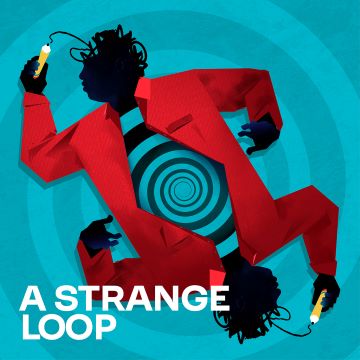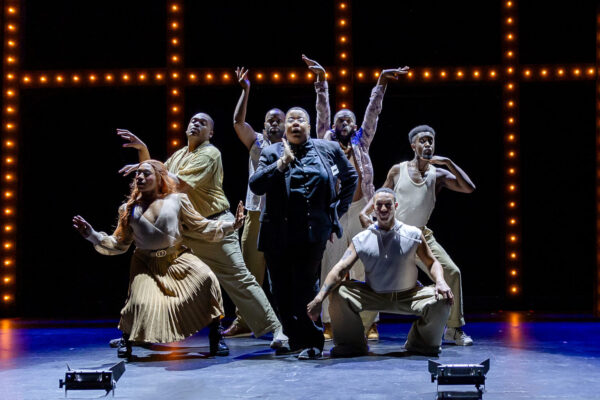A THEATRICAL LOOP-DE-LOOP
Playwright Michael R. Jackson’s acclaimed A Strange Loop (winner 2020 Pulitzer Prize for Drama, 2022 Tony Award for Best Musical) is a shocking work of genius, beautifully brought to Boston’s Wimberly Theatre by SpeakEasy Stage and Front Porch Collective and director Maurice Emmanuel Parent, starring Kai Clifton as Usher, “a fat American black gay man of high intelligence, low self-image, and deep feelings.” Jackson has taken the internal chatter that plagues us all and personified it in six roles (Thoughts 1 to 6—played by Grant Evan, Davron S. Monroe, Jonathan Melo, Aaron Michael Ray, De’Lon Grant, and Zion Middleton) who variously take on other roles in the course of the show—all of which occurs in Usher’s head during an intermission of the Broadway Disney show where he is (wait for it) an usher. Here’s the loop: Usher is a young man who’s writing a musical about a young man who’s writing a musical. The title of the show comes from Liz Phair’s “Strange Loop,” a reference to cognitive scientist Douglas Hofstadter’s book I Am a Strange Loop, in which he states that “we are self-perceiving, self-inventing, locked-in mirages that are little miracles of self-reference.” (I love that Michael R. Jackson, who says he has been plagued throughout his life by sharing the name of a Black superstar, has given his lead character the name of another Black superstar.)
Kai Clifton (center) and the company
Kai Clifton (center) De’Lon Grant, Davron S. Monroe, Jonathan Melo, Aaron Michael Ray (background), Grant Evan, and Zion Middleton (kneeling).
The show opens with a set (scenic design Jon Savage, lighting design Brian J. Lilienthal) reminiscent of the musicals Bye, Bye, Birdie and Chicago, with the six Thoughts in cells outlined by stage lights. Usher stands in the middle of the lower section with two Thoughts on either side of him and four Thoughts on the level above him as they call “Usher! Usher!” in the way that Company opens with a chorus of “Bobby! Bobby!” (or more recently, “Bobbi! Bobbi!”) and then the entire ensemble launches into the catchy “The Intermission Song!” which describes Usher’s efforts to write “a big Black and queer American Broadway show.” As the production unfolded, I recalled another favorite of mine from years past—Stew and Heidi Rodewald’s Passing Strange, and was pleased to see this cited as an influence. I’m sure there were numerous other influences that escaped me, as Jackson developed this musical over sixteen years. He calls it an “emotional autobiography,” explaining that the events and characters portrayed did not literally take place in his own life but that the emotions expressed are taken from his own experience.
Kai Clifton (center) and the company
No thought is out of bounds in this show. Yes, there is plenty of singing about and (simulated portrayal of) body parts and sex acts, but more shocking than any of that to my mind is Usher’s voicing of his longing to express his “Inner White Girl” (not so much the girl part, but the white part was what surprised me) and his admiration for singer-songwriters Liz Phair, Tori Amos, and Joni Mitchell. Becca Jewett’s rapid costume changes carry us through Usher’s refusal to capitulate to his parents’ and his agent’s urging to write a Gospel play for Tyler Perry (The crap he puts on stage, film, and TV/Makes my bile wanna rise); and his dismissal of those icons of African-American culture—The Color Purple! Harriet Tubman! Jimmy Baldwin! Zora Neale Hurston! Whitney Houston! In other words, the ancestors to whom he feels he owes something. Needless to say, there are lots of self-inflicted racist insults and a frank recognition of racism within the gay community, as well as the deeply disturbing expression of some elements of Christianity that claim “AIDS is God’s Punishment,” sung as an echoing Gospel choral number that repeats itself in an endless loop until one of the Thoughts breaks free and urges Usher to STOP!
Kai Clifton (center) and the company
Despite being a young gay man in New York City, Usher isn’t having a lot of sex, even though there is a lot of talk (thinking) and singing about different types of sex. The one promising encounter with a handsome Black stranger turns out to be a fantasy; urged by his Thoughts to act on his sexual ambivalence, Usher resorts to a humiliating encounter with Inwood Daddy, a white man who takes off his Confederate flag briefs to deliver racist insults along with rough sex.
Kai Clifton (left) and De’Lon Grant
The Company
Clifton has a gorgeous tenor. Honestly, in the recordings I’ve heard of the original Broadway cast, I preferred Clifton’s renditions. Admittedly, that may be because I actually saw the show live from beginning to end—but just to say there is nothing about this performance that will disappoint. Perhaps more important than his beautiful voice, Clifton conveys with his body language and expressiveness the vulnerability and humanity that is essential to transforming the very particular (frankly often shocking and unpleasant) experiences of this young black queer character into a universal truth: “I’m stuck with who I am.” Whatever your pronouns, race, sexual desires (or lack thereof), or religious background, you’ll likely find something in Usher’s experience that resonates for you.
Kai Clifton
Kai Clifton (center) and the company
This is the third show I’ve seen in the past few weeks that takes place primarily in the head of one of the characters (The Drowsy Chaperone from 2006 and Touching the Void from 2018). I kind of love this development, but at the same time, I have to wonder that these productions are coming to the forefront at this time. Are the events of the larger world so frightening that we feel a need to retreat into our own consciousness as a form of escape? (Yep.) It may just be a coincidence that I’ve seen three different plays that offer this internalized perspective, because it’s also true that each one attached a different meaning to the voices in the character’s head: in one case, it is the pleasure of nostalgia, in another a source of inspiration allowing perseverance, and finally, in A Strange Loop, a recognition of the role of these voices as enemies or allies in the quest for self-acceptance.
It’s a musical. Will you leave the show singing? Maybe not, suggests director Parent, acknowledging that “some of the lyrics might not be appropriate, so you’re gonna have to sing them to yourself.”
Kai Clifton (center) and the company
photos courtesy of Maggie Hall Photography
A Strange Loop
SpeakEasy Stage Stage and Front Porch Collective
Wimberly Theatre, Stanford Calderwood Pavilion
Boston Center for the Arts, 527 Tremont Street in Boston
ends on May 25, 2024
for tickets (starting at $25), call 617.933.8600 or visit SpeakEasyStage

